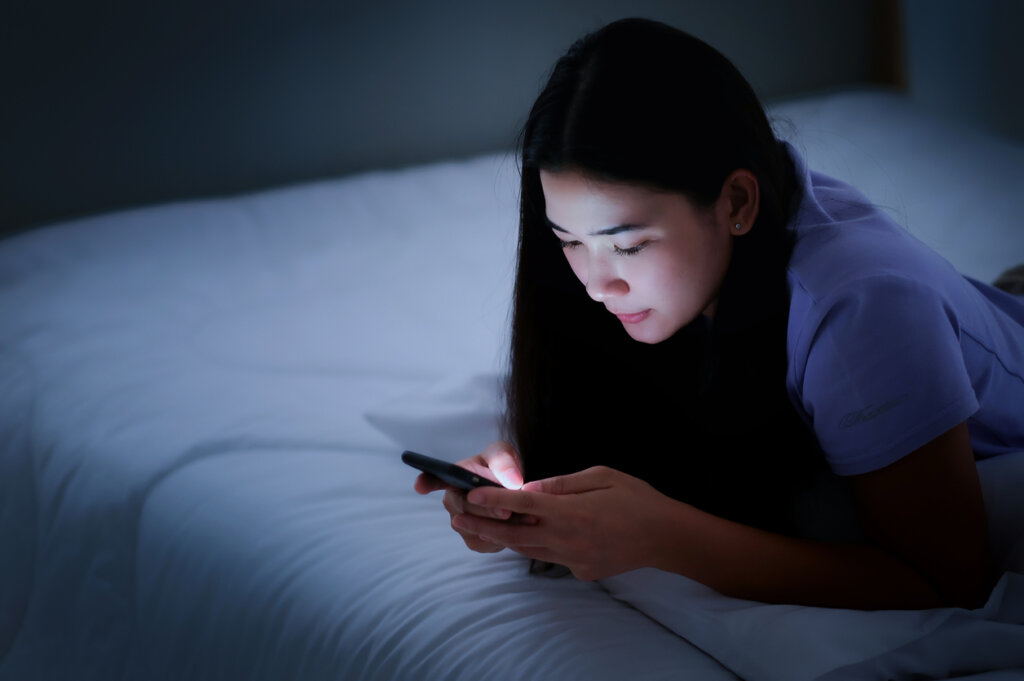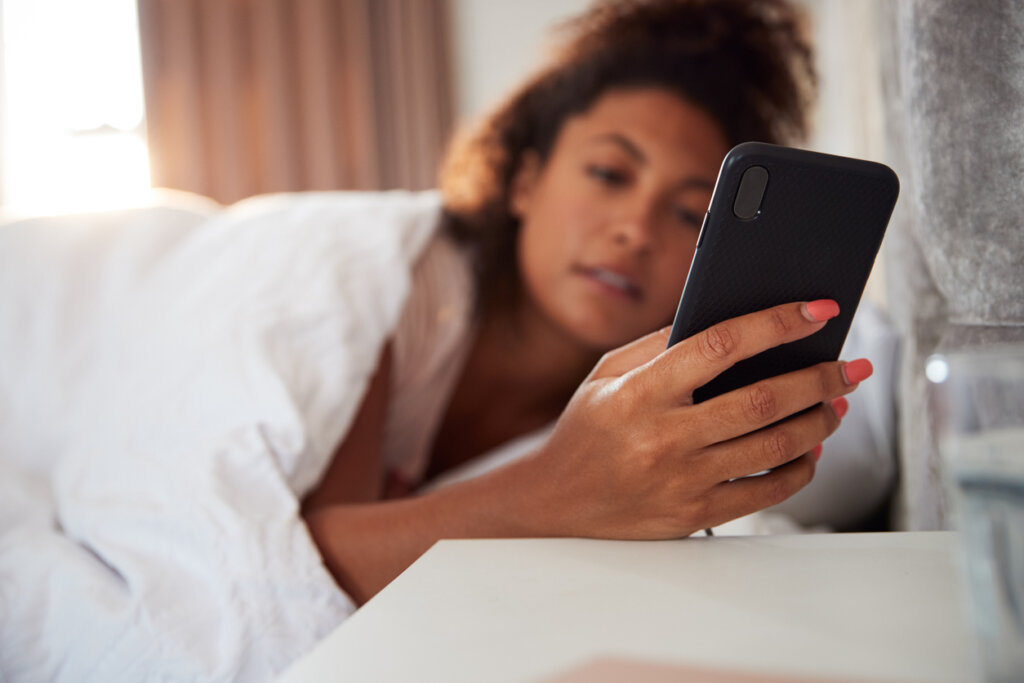Cell Phone Addiction: How It Affects You and What You Can Do About It


Written and verified by the psychologist Cristina Roda Rivera
Cell phone addiction can affect your ability to think. In fact, this device you use and look at almost every ten minutes can act in the manner of a drug, diminishing the value of other reinforcers, and slowing down your thinking.
According to psychology studies, cell phone addiction has been linked to slower and less accurate cognitive function. In recent years, research regarding cell phone addiction and consumer psychology has become more intense in order to define new interactions between the brain and technology.
Your habit of looking at the screen of your cell phone as soon as you get up every day says a lot about your dependence on this device. If you make the excuse that it works like a clock for you, ask yourself: did you do the same with your alarm clock? Indeed, these kinds of gestures are what determine your degree of dependence on your cell phone.
Mobile addiction or nomophobia
The term nomophobia derives from no mobile phone phobia. Nomophobia is the irrational fear of being offline or the obsessive fear of not being reachable on your cell phone. It’s called disconnection anxiety.
Your cell phone often acts as a distraction. However, when this starts to hamper your performance, it can cause you intense suffering. In this instance, it’s a far more serious occurrence. As a matter of fact, you’ll probably require professional help.

Symptoms
Many people are suffering anxiety and panic attacks when they’re unable to use their cell phone because the battery has run out or they’ve left it behind. These kinds of behaviors are more prevalent among high school and college students.
Nomophobia has been classified by psychiatrists as a real phobia and cell phone addiction has been linked to social anxiety disorder. Other symptoms of this addiction are reflected in the physical reactions of individuals who find themselves without their cell phones.
- Anxiety.
- Respiratory disturbances.
- Jerks and spasms.
- Sweating.
- Agitation.
- Disorientation.
- Tachycardia.
Psychological research has found that smarter people tend to use the search function on their smartphones less often. However, intuitive thinkers, who tend to be less intelligent, are more inclined to search for information on their cell phones.
Does using your thinking in a different way mean using technology in a different way? This idea has been the subject of investigation.
A matter of intelligence
Gordon Pennycook and his colleagues conducted a study that demonstrated that cell phones ‘supplant’ the brain’s function of thinking.
The study claimed that intuitive thinkers may look for information that they already know or could easily learn, but they aren’t really willing to put in the effort to think. In contrast, analytical thinkers, who, according to research, are generally smarter are less likely to use their cell phone’s ‘search’ feature.
Decades of research have revealed that humans are inclined to avoid expending brainpower and effort in order to find solutions. Therefore, you tend to use smartphones as if they were an extension of your mind.
An experiment
A study was conducted to test smartphone addiction. 660 participants were enlisted. Their verbal and literacy skills were tested, along with their thinking style. The results showed that people with more analytical thinking skills used the search function on their smartphones much less.
The study was published in the journal, Computers in Human Behavior (Barr et al., 2015). The research provided evidence that there’s a significant association between continued smartphone use and reduced intelligence.
The use of the cell phone: Numerous applications that generate dependency
It seems that cell phone addiction diminishes thinking capacities. In addition, other types of viewing habits associated with cell phones have been considered. For example, addiction to WhatsApp or social media.
The effects of continued cell phone use
A study by IDC Research made it absolutely clear. About 80 percent of smartphone users check their phones at least once within 15 minutes of waking up.
According to Dr. Nikole Benders-Hadi, using the phone as soon as we wake up can increase our anxiety.
Increased discomfort
A study conducted by the University of Gothenburg (Sweden) measured the effects of cell phone use on people in their 20s over the course of a year.
The research showed that heavy cell phone use was associated with increased reports of depression in both men and women. Furthermore, they suffered symptoms of stress and sleep problems.
Hijacked attention
When you’re checking your social media, email, and text messages, advertisements and other notifications enter your mind and contaminate your thoughts. These distract you and detract your attention from what you’re doing or are going to do.
Checking your cell phone when you wake up affects the rest of your day
According to Julie Morgenstern, author of the book, Never Check Email in the Morning, when you check your email or notifications first thing in the morning, “you never recover.” In fact, those requests, unexpected surprises, reminders, and problems are endless, leaving you with the impression that there’s very little you can leave for later.

Dopamine surge
When checking social media or email, your brain releases a great deal of dopamine, a neurochemical that makes you feel rewarded.
In fact, your brain craves dopamine like an eight-year-old craves sweets. For this reason, it stimulates the repetition of behaviors that lead to dopamine release.
Using your cell phone wisely
A cell phone is virtually indispensable in many areas of your life hence they’re difficult to avoid. However, following a few simple tips will help you use your cell phone wisely.
- Activate airplane mode if you want to set the mobile alarm clock.
- Delete applications that you never use.
- Disable app notifications with expendable information from the home screen. You can always consult them when you have some free time.
- Don’t use your cell phone first thing in the morning. This behavior can too easily become automatic. Instead, head straight for the shower and get ready for your day as soon as you get up.
- Set an exact time for a call and avoid waiting an entire afternoon for it.
- During work hours, use the email facility on your computer.
- Assume that, if there’s something really urgent, you’ll be able to be located without a problem. Therefore, it’s not necessary to look at your cell phone so often.
- Track the time you spend looking at the screen through applications designed for this.
In light of all this negative information, you may think that we’re demonizing the use of cell phones. Nevertheless, nothing could be further from the truth. In fact, we’re warning about the harmful effects of cell phone addiction. Using your cell phone in moderation doesn’t cause any of these problems.
Cell phone addiction can affect your ability to think. In fact, this device you use and look at almost every ten minutes can act in the manner of a drug, diminishing the value of other reinforcers, and slowing down your thinking.
According to psychology studies, cell phone addiction has been linked to slower and less accurate cognitive function. In recent years, research regarding cell phone addiction and consumer psychology has become more intense in order to define new interactions between the brain and technology.
Your habit of looking at the screen of your cell phone as soon as you get up every day says a lot about your dependence on this device. If you make the excuse that it works like a clock for you, ask yourself: did you do the same with your alarm clock? Indeed, these kinds of gestures are what determine your degree of dependence on your cell phone.
Mobile addiction or nomophobia
The term nomophobia derives from no mobile phone phobia. Nomophobia is the irrational fear of being offline or the obsessive fear of not being reachable on your cell phone. It’s called disconnection anxiety.
Your cell phone often acts as a distraction. However, when this starts to hamper your performance, it can cause you intense suffering. In this instance, it’s a far more serious occurrence. As a matter of fact, you’ll probably require professional help.

Symptoms
Many people are suffering anxiety and panic attacks when they’re unable to use their cell phone because the battery has run out or they’ve left it behind. These kinds of behaviors are more prevalent among high school and college students.
Nomophobia has been classified by psychiatrists as a real phobia and cell phone addiction has been linked to social anxiety disorder. Other symptoms of this addiction are reflected in the physical reactions of individuals who find themselves without their cell phones.
- Anxiety.
- Respiratory disturbances.
- Jerks and spasms.
- Sweating.
- Agitation.
- Disorientation.
- Tachycardia.
Psychological research has found that smarter people tend to use the search function on their smartphones less often. However, intuitive thinkers, who tend to be less intelligent, are more inclined to search for information on their cell phones.
Does using your thinking in a different way mean using technology in a different way? This idea has been the subject of investigation.
A matter of intelligence
Gordon Pennycook and his colleagues conducted a study that demonstrated that cell phones ‘supplant’ the brain’s function of thinking.
The study claimed that intuitive thinkers may look for information that they already know or could easily learn, but they aren’t really willing to put in the effort to think. In contrast, analytical thinkers, who, according to research, are generally smarter are less likely to use their cell phone’s ‘search’ feature.
Decades of research have revealed that humans are inclined to avoid expending brainpower and effort in order to find solutions. Therefore, you tend to use smartphones as if they were an extension of your mind.
An experiment
A study was conducted to test smartphone addiction. 660 participants were enlisted. Their verbal and literacy skills were tested, along with their thinking style. The results showed that people with more analytical thinking skills used the search function on their smartphones much less.
The study was published in the journal, Computers in Human Behavior (Barr et al., 2015). The research provided evidence that there’s a significant association between continued smartphone use and reduced intelligence.
The use of the cell phone: Numerous applications that generate dependency
It seems that cell phone addiction diminishes thinking capacities. In addition, other types of viewing habits associated with cell phones have been considered. For example, addiction to WhatsApp or social media.
The effects of continued cell phone use
A study by IDC Research made it absolutely clear. About 80 percent of smartphone users check their phones at least once within 15 minutes of waking up.
According to Dr. Nikole Benders-Hadi, using the phone as soon as we wake up can increase our anxiety.
Increased discomfort
A study conducted by the University of Gothenburg (Sweden) measured the effects of cell phone use on people in their 20s over the course of a year.
The research showed that heavy cell phone use was associated with increased reports of depression in both men and women. Furthermore, they suffered symptoms of stress and sleep problems.
Hijacked attention
When you’re checking your social media, email, and text messages, advertisements and other notifications enter your mind and contaminate your thoughts. These distract you and detract your attention from what you’re doing or are going to do.
Checking your cell phone when you wake up affects the rest of your day
According to Julie Morgenstern, author of the book, Never Check Email in the Morning, when you check your email or notifications first thing in the morning, “you never recover.” In fact, those requests, unexpected surprises, reminders, and problems are endless, leaving you with the impression that there’s very little you can leave for later.

Dopamine surge
When checking social media or email, your brain releases a great deal of dopamine, a neurochemical that makes you feel rewarded.
In fact, your brain craves dopamine like an eight-year-old craves sweets. For this reason, it stimulates the repetition of behaviors that lead to dopamine release.
Using your cell phone wisely
A cell phone is virtually indispensable in many areas of your life hence they’re difficult to avoid. However, following a few simple tips will help you use your cell phone wisely.
- Activate airplane mode if you want to set the mobile alarm clock.
- Delete applications that you never use.
- Disable app notifications with expendable information from the home screen. You can always consult them when you have some free time.
- Don’t use your cell phone first thing in the morning. This behavior can too easily become automatic. Instead, head straight for the shower and get ready for your day as soon as you get up.
- Set an exact time for a call and avoid waiting an entire afternoon for it.
- During work hours, use the email facility on your computer.
- Assume that, if there’s something really urgent, you’ll be able to be located without a problem. Therefore, it’s not necessary to look at your cell phone so often.
- Track the time you spend looking at the screen through applications designed for this.
In light of all this negative information, you may think that we’re demonizing the use of cell phones. Nevertheless, nothing could be further from the truth. In fact, we’re warning about the harmful effects of cell phone addiction. Using your cell phone in moderation doesn’t cause any of these problems.
All cited sources were thoroughly reviewed by our team to ensure their quality, reliability, currency, and validity. The bibliography of this article was considered reliable and of academic or scientific accuracy.
- Achangwa, C., Ryu, H. S., Lee, J. K., & Jang, J. D. (2022, December). Adverse effects of smartphone addiction among university students in South Korea: A systematic review. Healthcare, 11(1), 1-19. https://www.mdpi.com/2227-9032/11/1/14
- American Psychiatric Association [APA]. (2014). Manual diagnóstico y estadístico de los trastornos mentales (5a ed.). Editorial Panamericana.
- De-Sola, J., Rodríguez, F., & Rubio, G. (2016). Cell-phone addiction: A review. Frontiers in psychiatry, 7, 1-15. https://www.ncbi.nlm.nih.gov/pmc/articles/PMC5076301/
- Instituto Europeo de Salud y Bienestar Social. (s.f.). Adicción a los móviles: ¿es la nomofobia algo real? Consultado el 13 de octubre de 2023. https://institutoeuropeo.es/articulos/adiccion-a-los-moviles-es-la-nomofobia-algo-real/
- Liu, J., Xu, Z., Zhu, L., Xu, R., & Jiang, Z. (2022). Mobile phone addiction is associated with impaired cognitive reappraisal and expressive suppression of negative emotion. Frontiers in Psychiatry, 13, 988314. https://www.frontiersin.org/articles/10.3389/fpsyt.2022.988314/full
- Panova, T., & Carbonell, X. (2018). Is smartphone addiction really an addiction? Journal of behavioral addictions, 7(2), 252-259. https://www.ncbi.nlm.nih.gov/pmc/articles/PMC6174603/
- Ratan, Z. A., Parrish, A. M., Zaman, S. B., Alotaibi, M. S., & Hosseinzadeh, H. (2021). Smartphone addiction and associated health outcomes in adult populations: a systematic review. International Journal of Environmental Research and Public Health, 18(22), 1-17. https://www.mdpi.com/1660-4601/18/22/12257
- Sánchez-Carbonell, X., Beranuy, M., Castellana, M., Chamarro, A., & Oberst, U. (2008). La adicción a Internet y al móvil:¿ moda o trastorno?. Adicciones, 20(2), 149-159. https://www.redalyc.org/articulo.oa?id=289122057007
- Shoukat, S. (2019). Cell phone addiction and psychological and physiological health in adolescents. EXCLI journal, 18, 47-50. https://www.ncbi.nlm.nih.gov/pmc/articles/PMC6449671/?_ga=2.84943952.830217578.1697118640-336580219.1697118640
- Thomée, S., Härenstam, A., & Hagberg, M. (2011). Mobile phone use and stress, sleep disturbances, and symptoms of depression among young adults-a prospective cohort study. BMC public health, 11(1), 1-11. https://www.ncbi.nlm.nih.gov/pmc/articles/PMC3042390/
- Wacks, Y., & Weinstein, A. M. (2021). Excessive smartphone use is associated with health problems in adolescents and young adults. Frontiers in psychiatry, 12, 1-7. https://www.frontiersin.org/articles/10.3389/fpsyt.2021.669042/full?fbclid
- Wang, J., Hao, Q. H., Peng, W., Tu, Y., Zhang, L., & Zhu, T. M. (2023). Relationship between smartphone addiction and eating disorders and lifestyle among Chinese college students. Frontiers in Public Health, 11, 1-10. https://www.ncbi.nlm.nih.gov/pmc/articles/PMC10235600/
- Wilmer, H. H., Sherman, L. E., & Chein, J. M. (2017). Smartphones and cognition: A review of research exploring the links between mobile technology habits and cognitive functioning. Frontiers in psychology, 8, 1-16. https://www.ncbi.nlm.nih.gov/pmc/articles/PMC5403814/
- Bragazzi, N. L., & Del Puente, G. (2014). A proposal for including nomophobia in the new DSM-V. Psychology research and behavior management, 7, 155–160. https://www.ncbi.nlm.nih.gov/pmc/articles/PMC4036142/
- Barrios-Borjas, Dayara Alejandra, Bejar-Ramos, Valeria Andrea, & Cauchos-Mora, Vania Soledad. (2017). Uso excesivo de Smartphones/teléfonos celulares: Phubbing y Nomofobia. Revista chilena de neuro-psiquiatría, 55(3), 205-206. https://www.scielo.cl/scielo.php?script=sci_arttext&pid=S0717-92272017000300205
This text is provided for informational purposes only and does not replace consultation with a professional. If in doubt, consult your specialist.







